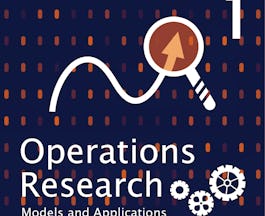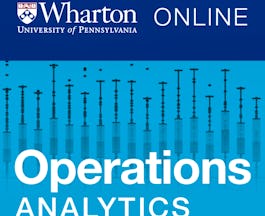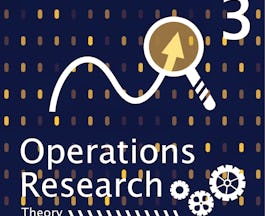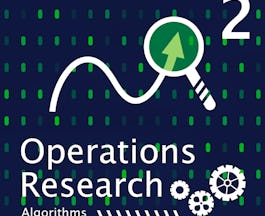Filter by
The language used throughout the course, in both instruction and assessments.
Explore the Operations Research Course Catalog
 Status: Free
Status: FreeNational Taiwan University
Skills you'll gain: Leadership and Management, Mathematics, Operations Management, Operations Research, Problem Solving, Strategy and Operations, Mathematical Theory & Analysis, Applied Mathematics, Business Analysis, Linear Algebra, Computer Programming

University of Pennsylvania
Skills you'll gain: Leadership and Management, Operations Management

University of Pennsylvania
Skills you'll gain: Data Analysis, Forecasting, Leadership and Management, Mathematical Theory & Analysis, Mathematics, Operations Management, Operations Research, Probability & Statistics, Spreadsheet Software, Statistical Analysis
 Status: Free
Status: FreeNational Taiwan University
Skills you'll gain: Operations Research, Mathematical Theory & Analysis, Mathematics, Algorithms, Linear Algebra
 Status: Free
Status: FreeNational Taiwan University
Skills you'll gain: Algebra, Algorithms, Mathematics, Operations Management, Operations Research, Linear Algebra, Mathematical Theory & Analysis, Computer Programming, Strategy and Operations

Rutgers the State University of New Jersey
Skills you'll gain: Inventory Management, Leadership and Management, Operations Management, Strategy and Operations, Supply Chain Systems, Supply Chain and Logistics, Critical Thinking, Process Analysis, Product Management

Salesforce
Skills you'll gain: Sales, Customer Relationship Management, Salesforce, Sales Systems, Account Management, Business Process Management, Customer Success, Leadership and Management, Marketing, Operations Management, Strategy, Strategy and Operations, B2B Sales, Databases, Business Analysis, Data Visualization, Data Visualization Software

University of Illinois Urbana-Champaign
Skills you'll gain: Leadership and Management, Operations Management

Rutgers the State University of New Jersey
Skills you'll gain: Leadership and Management, Organizational Development, Strategy and Operations, Communication, Business Process Management, Operations Management, Professional Development, Business Development, Business Communication, Strategy, Business Analysis, Leadership Development, Process Analysis, Critical Thinking, Human Learning, Operations Research, Regulations and Compliance, People Analysis, Change Management, Data Analysis, Data Management, Facility Management, Human Resources Operations, Probability & Statistics, Spreadsheet Software, Business Design, Customer Relationship Management

University of California, Davis
Skills you'll gain: Market Research, Research and Design, Marketing, Market Analysis, Communication, Business Research, Data Analysis, Critical Thinking, Decision Making, Strategy, Survey Creation, Business Communication, Customer Analysis, Exploratory Data Analysis, General Statistics, Correlation And Dependence, Data Visualization, Marketing Psychology, People Management, Probability & Statistics, Storytelling, Social Media, Writing, Digital Marketing

Skills you'll gain: Deep Learning, Leadership and Management, Machine Learning
 Status: Free
Status: FreeDuke University
In summary, here are 10 of our most popular operations research courses
- Operations Research (1): Models and Applications: National Taiwan University
- Introduction to Operations Management: University of Pennsylvania
- Operations Analytics: University of Pennsylvania
- Operations Research (3): Theory: National Taiwan University
- Operations Research (2): Optimization Algorithms: National Taiwan University
- Supply Chain Operations: Rutgers the State University of New Jersey
- Salesforce Sales Operations: Salesforce
- Operations Management: Organization and Analysis: University of Illinois Urbana-Champaign
- Healthcare Organization Operations: Rutgers the State University of New Jersey
- Market Research: University of California, Davis










